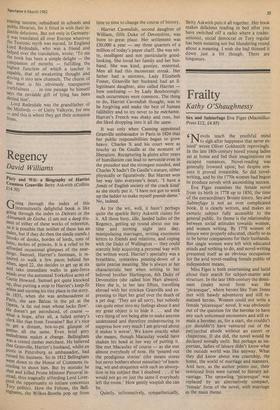Regency
David Williams
oing through the index of this
intermittently delightful book is like going through the index to Debrett or the Almanach de Gotha. (I am not a deep stu- dent of either of these works of reference, so it is possible that neither of them has an Index, but if they do then the simile stands.) Stooks of dooks, hordes of lords, tons of hens, inches of princes. It is a relief to be afforded occasional glimpses of the near- dregs. Samuel, Harriet's footman, is re- quired to walk a few paces behind her When, aged 22, she decides to get up at six and take immediate walks in gale-force winds over the autumnal Yorkshire acres of Castle Howard. Samuel got quite knocked UP, thus putting a stop to Harriet's keep-fit whim and earning his tiny place in the story. In 1835, when she was ambassadress at Paris, she saw Balzac in the pit at the OPera, 'a fat red man whose locks flow'. He doesn't get introduced, of course What a hope, after all, a failed notary's clerk like that from Touraine? But it's nice to get a distant, box-to-pit glimpse of genius all the same. Even brief gory melodrama makes a change. Bellingham was a crazed timber merchant. He believed that Granville, Harriet's husband, whilst en Poste in Petersburg as ambassador, had ruined his business. So in 1812 Bellingham went down to the House of Commons Hi-
te, i
in- tending to shoot him. But by mistake he snot and killed Prime Minister Perceval in- stead, thus tragically affording Lord Liver- Pool the opportunity to initiate concensus °rY politics. How the Feltons, the Bell- inghams, the Wilkes-Booths pop up from
time to time to change the course of history.
Harriet Cavendish, second daughter of William, fifth Duke of Devonshire, was born to great place. Her settlement was £30,000 a year — say three quarters of a million of today's paper chaff. She was wit- ty, intelligent and not particularly good- looking. She loved her family and her hus- band. She was kind, gossipy, maternal. Men all had this inconstant streak. Her father had a mistress, Lady Elizabeth Foster, Granville her husband had an il- legitimate daughter, also called Harriet how confusing — by Lady Bessborough: such occurrences were common. The thing to do, Harriet Cavendish thought, was to be forgiving and make the best of human fallibility and to try never to be mechanic.. Harriet's French was shaky and rum, but she liked dropping into it all the same.
It was only when Canning appointed Granville ambassador in Paris in 1824 that her public responsibilities began to grow heavy. Charles X and his court were as touchy as De Gaulle at the moment of liberation. Recapturing la gloire after years of humiliation can lead to nervosite even in the proudest and the strongest minded, and Charles X hadn't De Gaulle's stature, either physically or figuratively. But Harriet won her way into everyone's heart. `I have a fonds of English society of the crack kind' as she nicely put it. `I have not got to work up the ladder to make myself grande dame.' No, indeed.
As for the wit, well, it hasn't perhaps quite the sparkle Betty Askwith claims for it. All those busy, idle, landed ladies of the Regency, getting up round about our tea- time and turning night into day, manipulating marriages, writing enormous letters to friends and relations, and coping with the Duke of Wellington — they could scarcely help acquiring a personal way with the written word. Harriet's speciality was a breathless, syntaxless pinning-down of a quite precise meaning. She is always at her characteristic best when writing to her beloved brother Hartington, 6th Duke of Devonshire (she called him Hart always). Here she is, in her late fifties, travelling abroad with her stricken Granville and ex- pressing to Hart her grief over the death of a pet dog: `They are all sorry, but nobody can quite enter into my feelings about it and my great object is to hide it . . . and the very thing of not being able to make anyone understand and therefore endeavouring to suppress how very much I am grieved about it makes it worse'. We know exactly what she means, though Macaulay would have shaken his head at her way of putting it. She met Macaulay of course — as she met almost everybody of note. He `poured out the prodigious stories' (she means stores but never bothers about minutiae) `of learn- ing, wit and eloquence with such an absorp- tion in his subject that I doubted . . . if he would not go on just the same if everybody left the room.' How gently waspish she can be.
Quietly, informatively, sympathetically, 'Betty Askwith puts it all together. Her book makes delicious reading in bed after you have switched off a radio where a trades- unionist, social democrat or Tory regular has been meaning not but blundering round about a meaning. I wish she had thinned it down just a bit though. There are longueurs.






































 Previous page
Previous page